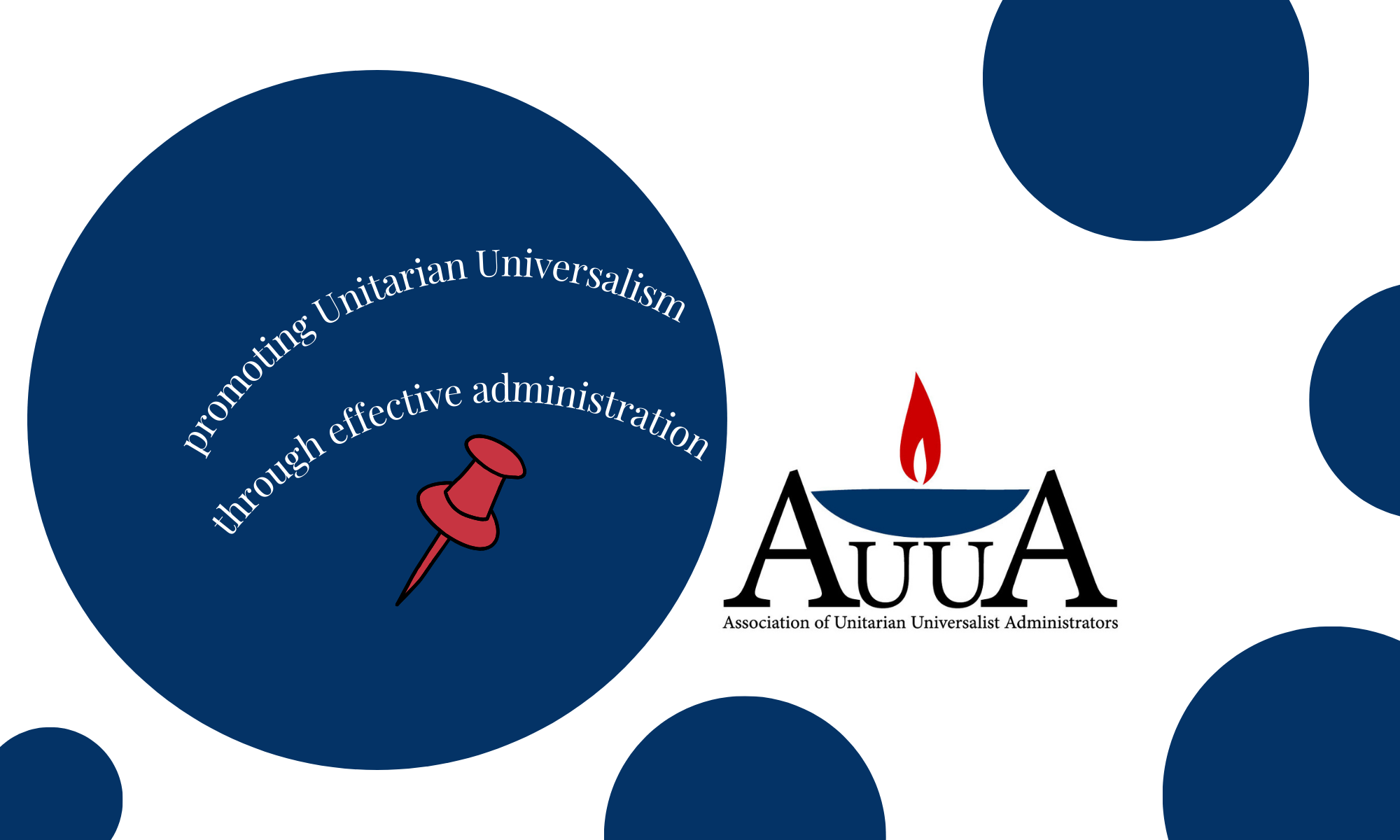AUUA Code of Professional Practices
(Code of Professional Ethics)
(Adopted at the AUUA 2024 Annual Meeting)
Preamble
We, the members of the Association of Unitarian Universalist Administrators (AUUA), affirm this Code of Professional Ethics as our standard of commitment to congregational administration. This Code will be followed by all the members of this Association who are engaged as Professional Administrators working in UU congregations, the Unitarian Universalist Association, or UU affiliated organizations, and will be supported by all who are joining our membership.
I. Self
A. As a professional administrator serving within the Unitarian Universalist Association and Canadian Unitarian Council, I commit myself to honor the ideals of professional administration in a religious institution, and to actively explore and articulate the underlying values and principles that those ideals express.
B. I recognize that as a professional in whom trust and power have been placed, I am both morally and legally in a professional relationship to which I am called to be faithful. I will never abuse the authority of my position by manipulating others to satisfy my personal needs and will refrain from engaging in objectionable behavior. Objectionable behaviors may include, but are not limited to, sexual behavior with any child, adolescent, or vulnerable adult; sexual relations with congregants or colleagues serving my congregation or organization. I will observe the legal requirements of my state or province regarding the reporting of physical or sexual misconduct.
C. The recognition of the importance of administration by my congregation requires acknowledgement of my worth as a religious professional. Understanding that other religious professionals will follow after me, I will be willing to work actively with an appropriately designated group within my congregation to help establish up to- date standards of fair compensation and working conditions that support our profession.
D. I recognize the need for and will participate in continuing professional development and training.
E. I will refrain from private as well as public words or actions which are degrading to my congregation’s ministry or destructive of congregational life.
F. I will work to be actively inclusive, using language and actions that create and sustain a welcoming environment for all. I will refrain from the use of discriminatory speech or practices, and I will strive to serve each member of my religious community impartially and without bias.
II. Colleagues
A. Since I share the welfare of the congregation with other religious professionals, I will seek to be part of mutually cooperative, supportive, open, consultative and ethical relationships with them as we carry out our shared and separate responsibilities. Should difficulties arise, I will seek help judiciously and express my concerns professionally, keeping in mind the dignity and value of my position.
B. I recognize that in my relationship with other religious professionals, I have a responsibility to be supportive in both personal and public situations. I will offer honest and caring responses to them and designate appropriate help when called for. Understanding the trust that colleagues place in relationships with each other, I will honor the need for confidentiality. I accept the responsibility to confront a colleague’s misuse of power, or to report concerns about suspected misconduct.
III. Congregation
A. I will uphold and honor the liberal religious principles of congregational polity and inclusiveness, within the congregation I serve, knowing that by modeling such principles, I am upholding the experience of free religious life for the entire congregation.
B. I will encourage healthy communication and avoid triangulation with members of the congregation.
C. I will exercise good stewardship in the use of the church’s resources and encourage others to do likewise.
D. In the case of planned or forced resignation or significant change in role or responsibility, I will work with congregational leadership to execute a well-managed departure or change. Additionally, when leaving my position, I will covenant with my congregation’s leadership to remain absent from all church activities for an agreed period of time to ensure a healthy transition.
E. In the event that I remain a member in the congregation where I have previously served as an administrator, I will refrain from being involved in the process of selecting my successor. Further, I will support my successor by leaving room for them to establish their own identity and leadership in the congregation and by refraining from accepting positions on policy-making bodies in the congregation (such as board, finance committee, personnel committee) for two years. I will encourage members of the congregation to speak to their current administrator or other appropriate persons for answers to all current administration issues or concerns.
IV. Within the AUUA
A. As an AUUA member, I understand my responsibility to educate lay people and other religious professionals about the qualifications for and dimensions of professional administration, and to enlist their help in accordance with appropriate status to professional administrators.
B. To promote professional integrity and leadership, I will advocate for AUUA’s Code of Professional Ethics.
C. I will support and participate in activities and programs of the UUA and Canadian Unitarian Council as applicable, and encourage the participation of others in such events, knowing that wider participation will lead to deeper understanding of our goals as religious professionals.
V. The Larger Community
A. As a religious professional, I understand that whenever I participate in the wider community, I represent the faith group by which I am employed, Unitarian Universalism, and the AUUA. I will strive to be a model of ethical leadership.
B. I will honor our ongoing work for justice, equity, diversity, and inclusion.
C. I will support my congregation’s work in community and world issues.
